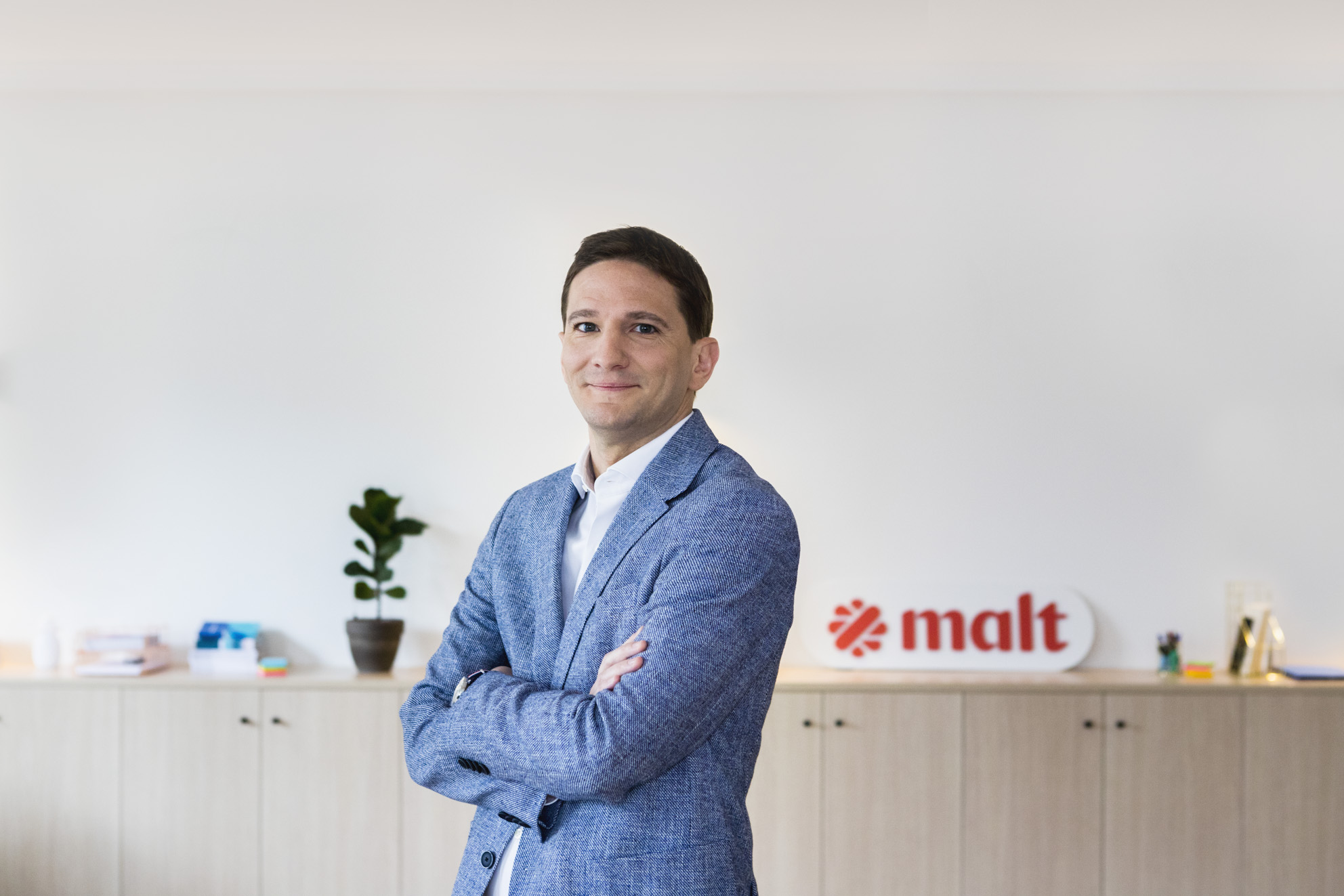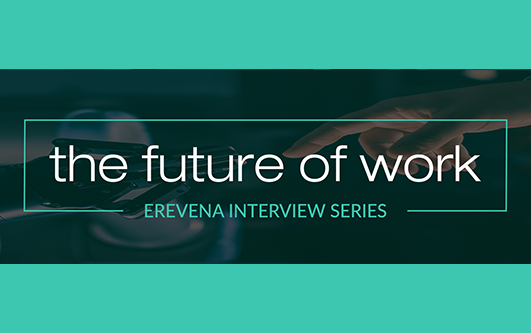Alexandre Fretti, Managing Director at Malt, talks to Erevena’s Lilian Poilpot, Partner about scaling, funding and how the company encourages its people to “be heroes” as it disrupts the European freelance market.
What does Malt do?
Malt is the leading end-to-end marketplace where companies and organizations find the right freelance talents / independent talents to match their business’ needs. We put both sides of the market — freelancers and employers — in contact with each other and currently have more than 310,000 freelancers in our community. Our B2B clients range from large corporates to SMBs. For example, 85% of the French CAC 40 (stock market index) use Malt. We have a similar market share in Germany and currently have offices in France, Germany, Spain, Netherlands and Belgium, with big plans to expand further afield.
Can you give us some background on Malt?
The company was co-founded in 2013 by Vincent Huguet and Hugo Lassiège. I joined in 2020 as managing director. Vincent had founded several companies and each time faced the challenge of how to attract the best talent on the market. He recognized that this talent wasn’t confined to permanent employees but could also be freelance talent. At that time, however, there was no easy way to find freelancers. He and freelance developer Hugo met up and began to discuss how to address this challenge and create a new work order with freelancers at its core. They were big fans of Airbnb and its unique approach to designing and scaling a disruptive market model. These were the drivers that formed Malt’s DNA.
You describe Malt as disruptive — why is this the case?
We’ve turned the freelance market upside down. Malt has reversed the bargaining power by putting it in the hands of the freelancers, rather than the employers. So, we are a freelancer-first company rather than a B2B-first company and our business clients have had to rethink their approach to hiring talent. It’s not the same as it was 10 years ago when companies waited for talent to come to them — now they have to go to the talent and Malt’s marketplace enables this.
How does Malt differ from other providers in this area?
Of course, there are other companies doing a similar job, but Malt is pretty unique in that it’s an open marketplace. There is total transparency between the freelancers and the business clients, whereas other providers, whether working online or offline, keep a lot of information hidden. In our case, freelancers openly sharing their daily rate on our platform. Companies can contact them directly knowing what they’ll be paying.
Another differentiator is that Malt manages the entire value chain. This removes the hassle for both freelancer and client, from the beginning of the contract to creating records, checking legals, and managing payments. This latter point is important for our freelance base because we pay them within 48 hours of an assignment, even if it takes several months for Malt to receive payment from the client. This brings a level of freelancer loyalty as they have assurance that they’ll be paid fast.
What is driving your growth?
First of all, the freelance market is large and expanding. Currently, in Europe alone, it is valued at around €350 billion and we have an ambition to seize a big share of this. Our growth is being driven in part by a high volume of repeat business from big corporate clients who are gradually building their level of freelancers year-on-year. This is a new spending category for many corporates who are often going from a base of zero freelancers. So, our growth is tied to this and the big long-term contracts we have with our clients.
Our growth is also being driven by heavy investment in our product with its AI-powered search engine and intuitive online interface. We’ve made it as easy as possible to do business with us from anywhere — even your sofa! Our product mindset is important, and we believe it sets us apart. Other companies might say they have a ‘product’ but it’s simply a website with some add-ons. Our investment in the continuing development of our marketplace ensures it brings value not only in terms of the money it generates but in the way it ensures our scalability going forward.
What expansion plans do you have?
We are planning to expand our international presence to other western European countries in the next two years and will carry out some M&A activity to accelerate this. For example, I anticipate Malt entering the UK market via the M&A route. Freelancing on this level is relatively young and only just beginning to scale, so M&A will give us the speed that’s so crucial to continued growth.
How has the global pandemic affected your business?
We didn’t find it a hard thing to pivot to remote working because of our focus on the freelance world, which was remote before Covid. We connect with our freelancers remotely, so the global shift to this way of working was quite natural for us. For our own people, there has been no one size fits all approach to working from home as different roles are better suited to working remotely, such as in the product team, whereas our salespeople might want to be in the office. Our culture is such that we are transparent and accept these different needs.
At a business level, this question ties back to your earlier one about Malt’s growth. At the start of 2020 our turnover flattened as projects stopped but by September of that year there was an upsurge in demand for freelancers. As employees began to work autonomously from home, companies began to question the need for permanent employees. So, in effect, the pandemic accelerated our growth as businesses began to rethink their HR models and incorporate freelancers into them. There’s also been a change in the age range of the freelancers at Malt. Before the pandemic around 90% were between 30 and 45, with the average age 37. Freelancing wasn’t for younger people who still needed to develop their skills, while older workers had settled into permanent roles and weren’t really interested in freelancing. That’s all changed. People are now leaving business school and saying they don’t want a boss; they just want a client. The same applies to more senior people who are now seeing freelancing as a great option.
Can you tell us more about your relationships with the freelancers?
We hold a lot of events and webinars to introduce freelancers to what we do and how we work. And we’ve developed what we call our Malt Academies to train freelancers, either via peer-to-peer learning or by bringing in people to work with them. Our relationships are also founded on the finance, marketing and sales services we bring to the table, such as the payment factoring I mentioned earlier and our partnership with AXA providing insurance. We also have partnerships with a bank and some healthcare providers. It’s all designed to help freelancers become entrepreneurs and grow with simple administrative, legal and payment processes all in one place.
In 2022 we’re adding another layer to our freelancer relationships. In the last fundraising round in 2021, we convinced the new shareholders of the value to be gained from setting up a €1 million pool for Malt freelancers. In effect, our top freelancers will become shareholders. And we will be setting up a Malt Community Advisory Board to ensure they are completely involved in our strategy and product. While the freelancers are not employed by us in the traditional sense, they’re the people doing the work for our clients, so we’re thinking a little differently about how we engage with them.
How do you check and validate the freelancers?
By default, we only check the legal aspects. That’s because our approach is built on recommendation. We believe that the best way to validate somebody is for somebody else to give their approval. So, for example, a client might say that they’ve worked with a particular freelancer and will give them a rating. Our model makes it mandatory for a client to give their feedback via the Malt platform. We also insist on meeting all the freelancers we put on to a project to ensure they’re the right fit for the scope of work.
What key challenges are you and the world of freelancing facing?
The first challenge is making the change happen on the client side. How do we get companies to think differently about freelancers? We are creating a new market and recognize that it is hard for companies to change established ways of working. The legal implications of moving to a freelance model are also a challenge because many businesses still consider freelancing as a risk. From our perspective there are different legal hoops to jump through in each country, with no alignment across Europe.
Malt is also pushing to get a wider understanding that the freelance economy is totally different to the gig economy businesses like Uber and Deliveroo. We need to find ways to open the doors to this new economy, globally and legally. The freelance economy is going to keep growing. In the US, it’s estimated that 1 in 3 workers are independent, with predictions that 50% will be freelance in the next 10 years. It’s been called ‘the big quit’ as people realise it’s OK to leave their jobs and work as freelancers. Europe will likely follow suit. In the UK the figure already stands at between 10% and 15% and in France it is currently 10%.
With growth on the cards, how do you attract the talent you need?
Recruitment is key to our growth and with the job market so competitive at the moment, it’s critical to get it right. We have internalised 80% of it, with a team of 10 recruiters focused on bringing on board new talent in three core areas: sales and marketing, product and technology, and HR & finance operations. Our aim is to recruit another 200 people over the next two years, scaling to around 500. For the senior exec-level roles making up the remaining 20%, we work with search firms such as Erevena who recently placed Segolene Finet, our Chief Marketing Officer.
Share this article:












